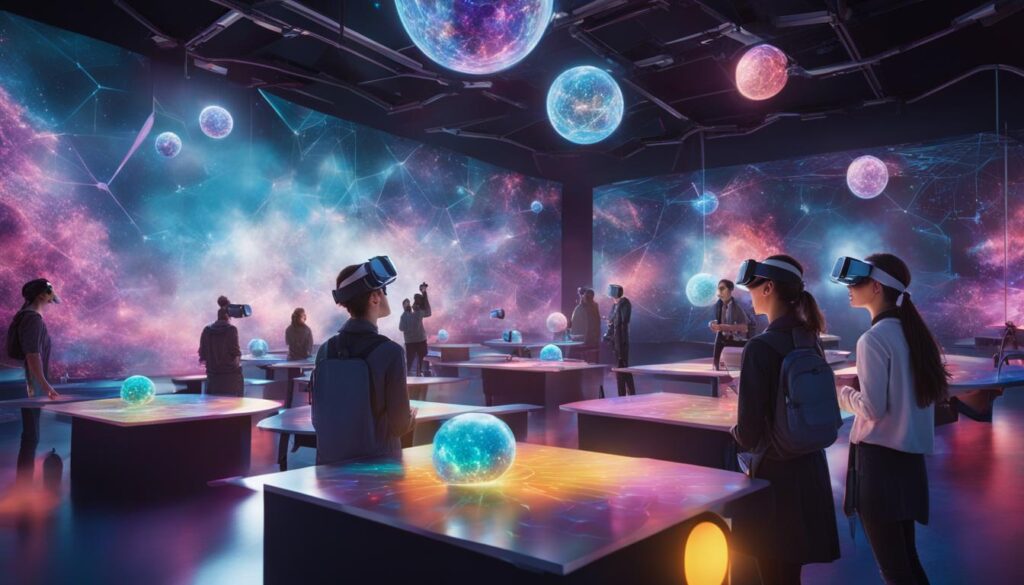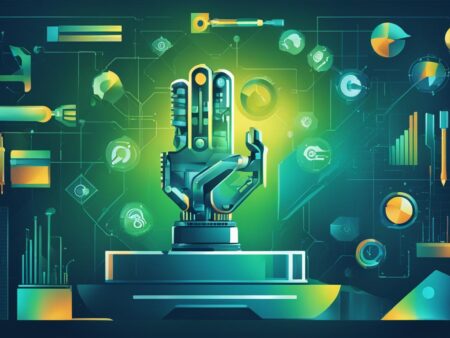AI, or artificial intelligence, has revolutionized various industries, and education is no exception. EdTech companies are harnessing the power of AI to transform the way we learn and acquire knowledge. By leveraging AI technologies such as machine learning, deep learning, and robotics, these companies are redefining education with innovative approaches and technologies.
The AI education market is rapidly growing, with the sector expected to exceed $20 billion by 2027. The integration of AI in education has the potential to enhance the learning experience, personalize instruction, and close the skill gap.
Key Takeaways:
- AI is revolutionizing the education sector, offering personalized learning experiences and innovative teaching methods.
- AI education companies utilize technologies like machine learning and robotics to enhance the learning experience.
- The AI education market is projected to reach $20 billion by 2027.
- The integration of AI in education aims to close the skill gap and provide targeted instruction.
- EdTech companies are at the forefront of AI-driven education, transforming traditional teaching approaches and shaping the future of learning.
The Future of Learning: AI-driven Education
AI-driven education is revolutionizing traditional teaching methods and paving the way for the future of learning. Through the power of sophisticated algorithms, AI analyzes vast amounts of data to provide personalized and adaptable learning experiences for students. This personalized learning approach enables students to learn at their own pace, focusing on their unique strengths and weaknesses.
One of the key advantages of AI in education is its ability to incorporate immersive technologies such as augmented reality (AR) and virtual reality (VR). These technologies create interactive and engaging educational experiences, allowing students to visualize complex concepts and explore virtual environments. AR applications can overlay digital information onto the real world, enhancing students’ understanding and retention of information. VR, on the other hand, allows students to immerse themselves in virtual simulations, offering a hands-on approach to learning.
Conversational AI, including chatbots and virtual tutors, also plays a pivotal role in AI-driven education. These AI-powered tools provide quick assistance, answer students’ questions, and offer guidance whenever needed. By promoting independent learning, conversational AI empowers students to take ownership of their education and develop critical thinking skills.
Overall, AI-driven education holds immense promise for transforming the way we learn and educate. By harnessing the power of AI, personalized learning experiences, immersive technologies, and conversational AI, education can become more engaging, effective, and tailored to each student’s needs.
Image depicts a student using virtual reality headset in an educational setting.
10 Applications and Benefits of AI in Education
AI has significantly transformed the education sector, offering a wide range of applications and benefits that enhance the learning experience. Let’s explore some examples:
1. Personalized Learning
AI enables personalized learning experiences by analyzing individual student data and adapting the curriculum accordingly. This tailored approach helps students grasp concepts more effectively and at their own pace.
2. Task Automation
With AI, administrative tasks such as grading, attendance tracking, and scheduling can be automated, freeing up valuable time for teachers to focus on instructional activities.
3. Smart Content Creation
AI-powered tools can generate customized content, including interactive quizzes, practice exercises, and learning materials tailored to individual student needs, making the learning process more engaging and effective.
4. Adaptable Access to Information
AI can provide students with flexible and on-demand access to learning resources, allowing them to explore subjects beyond the classroom and engage in self-directed learning.
5. Determining Classroom Vulnerabilities
By analyzing data on student performance and engagement, AI can identify classroom vulnerabilities and alert teachers to areas that may need additional support or targeted interventions.
6. Closing the Skill Gap
AI offers upskilling opportunities for students and educators alike, helping to close the skill gap by providing personalized recommendations for professional development and learning pathways.
7. Customized Data-Based Feedback
AI-powered assessment tools can provide detailed and timely feedback to students, highlighting areas for improvement and guiding their learning journey based on their individual strengths and weaknesses.
8. 24*7 Assistance with Conversational AI
Conversational AI tools, like chatbots and virtual assistants, can offer round-the-clock support to students, answering their questions, providing explanations, and offering guidance whenever needed.
9. Secure and Decentralized Learning Systems
AI ensures the security and privacy of educational data through advanced encryption and decentralized learning platforms, protecting sensitive information and fostering a safe online learning environment.
10. Improved Accessibility
AI technology aids in making education accessible to all learners, including those with disabilities. It can provide alternative formats, real-time transcriptions, and AI-powered assistive technologies to support diverse learning needs.
By harnessing the power of AI in education, we can unlock new opportunities for personalized and adaptive learning, improve student outcomes, and create a more inclusive educational experience for all.
Role of AI in the Education Sector
In the education sector, AI systems play a crucial role in various aspects, ranging from tracking school processes to enhancing instruction. These AI-powered systems revolutionize teaching and learning, providing personalized experiences for students and improving the overall quality of education.
One of the significant contributions of AI in education is the ability to enable personalized learning experiences. AI systems evaluate students’ learning needs and tailor the curriculum accordingly, ensuring that each student receives personalized attention and support. By analyzing data such as student performance, interests, and behavior, AI systems create adaptive learning paths that cater to individual strengths and weaknesses.
Moreover, AI systems excel at evaluating and examining students’ work. Through sophisticated algorithms, AI can assess assignments, projects, and exams quickly and accurately. This not only saves teachers valuable time but also provides students with timely feedback to enhance their learning process. AI-powered tools can identify areas where students may be struggling and provide targeted resources or recommendations for improvement.
Additionally, AI systems improve teaching techniques by automating certain administrative tasks, such as grading and data management. This automation allows teachers to focus their efforts on instruction and student engagement instead of being overwhelmed by administrative duties. By reducing the workload for teachers, AI frees up valuable time for them to invest in planning and implementing more effective teaching strategies.
Furthermore, AI-powered systems contribute to the improvement of instruction quality. By analyzing vast amounts of data, AI can identify trends, patterns, and insights that inform the development of more effective teaching methods. Teachers can leverage these insights to create engaging and impactful lessons tailored to the specific needs of their students.
Benefits of AI in the Education Sector
| Benefits | Description |
|---|---|
| Personalized Learning Experience | AI enables tailored learning paths based on individual students’ needs, interests, and progress. |
| Improved Instruction | AI automates administrative tasks, reduces teacher workload, and enhances teaching techniques. |
| Examining Students’ Work | AI systems evaluate assignments, projects, and exams, providing timely and targeted feedback to students. |
| Improves Teaching Techniques | AI analyzes data to identify trends and insights, allowing teachers to develop more effective instructional methods. |
By leveraging AI systems in the education sector, schools and educators can enhance the learning experience, optimize instruction, and empower students to reach their full potential.
Benefits of AI in the Education Sector
Integrating AI in education brings numerous benefits. By harnessing the power of AI, we can create personalized learning experiences that cater to the unique needs and preferences of each student. AI algorithms analyze vast amounts of data to understand students’ strengths, weaknesses, and learning styles, allowing us to tailor educational content accordingly. This personalized approach enhances student engagement and comprehension, leading to better academic outcomes.
Another significant advantage of AI in education is the improvement in instruction. By automating administrative tasks, such as grading and attendance tracking, AI reduces the burden on teachers, giving them more time and energy to focus on teaching. Additionally, AI can analyze students’ work and provide immediate feedback, highlighting areas where improvement is needed. This targeted feedback enables instructors to identify gaps in their teaching techniques and adjust their instruction accordingly, leading to more effective teaching practices.
Examining students’ work is an essential part of the learning process. AI tools can analyze and evaluate student assignments, projects, and assessments, providing valuable insights to both students and teachers. AI-based assessment systems can identify areas of strength and weakness, enabling educators to offer tailored support and guidance. Moreover, AI can identify patterns and trends in student performance, allowing teachers to intervene early and provide additional resources or interventions when necessary.
Moreover, AI-driven education fosters critical thinking and problem-solving skills. By encouraging students to think critically and independently, AI helps cultivate skills that are essential for success in the modern world. AI-powered educational tools and platforms often include interactive elements and collaborative features, providing students with opportunities to apply their knowledge, work on real-world challenges, and engage in meaningful problem-solving activities.

In conclusion, AI in the education sector offers a multitude of advantages, including personalized learning experiences, improved instruction techniques, in-depth analysis of students’ work, and the promotion of critical thinking skills. By harnessing the power of AI, we can create a more effective and engaging learning environment that supports the individual needs of each student, empowers educators to deliver high-quality instruction, and prepares students for future success.
What are the Best Recommendations to Integrate AI in the Classroom?
Integrating AI in the classroom is a collaborative endeavor that requires partnering with a trusted AI provider. Finding a reliable partner who can offer training, assistance, and coaching is essential. At [Trusted AI Provider Name], we understand the importance of integrating AI in education and have a proven track record of supporting schools and educators in this journey.
One crucial aspect of introducing AI in the classroom is encouraging critical thinking among students. As AI becomes more prevalent in society, it’s vital for students to evaluate the ethical implications and understand the impact of AI’s widespread adoption. By fostering critical thinking skills, students can become responsible and discerning users of AI technology.
When incorporating AI into the curriculum, it’s advisable to take a gradual approach. Teachers can begin by identifying specific areas where AI can enhance learning outcomes and slowly integrate AI tools and resources. This gradual implementation allows teachers to gain confidence in using AI while continuously refining their teaching practices. It also enables them to monitor the impact of AI on student learning, making adjustments as needed.
The Real Examples of AI in the Education Field
Major companies are successfully incorporating AI in the education field, revolutionizing the way we learn and teach. Let’s take a look at some prominent examples of how AI is transforming education:
Google Classroom
Google Classroom, powered by AI, has been widely adopted by educational institutions worldwide. It streamlines teaching processes, allowing educators to create and manage assignments, distribute materials, and communicate with students seamlessly. AI algorithms analyze student performance data to offer personalized recommendations, helping educators deliver targeted instruction and support.
Coursera
Coursera, a leading online learning platform, leverages AI to provide personalized course suggestions to learners. By analyzing user preferences, learning patterns, and career goals, Coursera’s AI algorithms recommend relevant courses, making the learning journey more tailored and efficient. Additionally, AI-powered assessments deliver instant feedback to learners, allowing them to track their progress and identify areas for improvement.
Duolingo
Duolingo, a popular language learning platform, integrates AI to develop flexible learning lessons that adapt to learners’ individual needs. AI algorithms analyze learner behavior, progress, and performance to create customized learning paths and provide targeted exercises. Duolingo’s AI-powered system also tracks learner progress, offering insights and motivation to help learners achieve their language learning goals.
These real examples demonstrate how AI is being successfully integrated into the education field, empowering learners and educators alike. As AI continues to evolve, we can expect more innovative applications and transformative experiences in education.
Applications & Advantages of AI in Education
AI technology offers numerous applications and advantages in the field of education, revolutionizing the way we teach and learn. Let’s explore some of the key areas where AI has made a significant impact.
Task Automation
One of the primary advantages of AI in education is task automation. AI-powered systems can automate routine administrative tasks such as grading, attendance management, and scheduling, freeing up valuable time for teachers to focus on instruction and providing personalized support to students.
Personalized Education
AI enables personalized education by analyzing individual student data and tailoring learning experiences based on their specific needs and learning styles. Through adaptive learning algorithms, AI systems can identify knowledge gaps, offer targeted interventions, and provide personalized recommendations to enhance student engagement and academic performance.
Smart Content Creation
By leveraging AI technology, educators can create smart content that adapts to students’ progress and learning preferences. AI algorithms can generate interactive and dynamic learning materials, including videos, simulations, and interactive quizzes, to enhance student understanding and promote active learning.
AI in Examinations
AI plays a crucial role in examinations by ensuring fairness and security. AI-powered proctoring systems can monitor and detect cheating behaviors during online exams, preserving the integrity of the assessment process. Additionally, AI algorithms can automate grading, providing faster and more consistent feedback to students, thereby saving time for educators.
In summary, AI offers a range of significant advantages in education, from automating administrative tasks to providing personalized education and creating smart content. With its role in exam administration, AI ensures a fair and secure assessment process. The integration of AI technology in education continues to shape the future of learning, empowering students and teachers alike.
Emerging Technologies in Education to Pair with AI
In addition to AI, emerging technologies such as IoT, augmented reality, and virtual reality have the potential to revolutionize education. These technologies open up exciting possibilities for enhancing the learning experience and fostering deeper engagement among students.
Internet of Things (IoT) in Education:
IoT devices play a crucial role in creating smart classrooms by providing real-time data on classroom activities. These devices can monitor student attendance, track progress, and collect data that can help educators gain valuable insights into student learning patterns. With IoT in education, teachers can make data-driven decisions, personalize learning experiences, and identify areas where students may need additional support.
Augmented Reality (AR) in Education:
Augmented reality is a technology that overlays digital content onto the physical world, enhancing the learning experience in various subjects. By using AR applications, students can visualize complex concepts, explore virtual simulations, and interact with realistic 3D objects. This immersive experience promotes deeper understanding, encourages collaboration, and sparks creativity among learners.
Virtual Reality (VR) in Education:
Virtual reality creates simulated environments that provide students with immersive learning experiences. In subjects like anatomy and physiology, VR can transport students to virtual labs where they can perform experiments, explore anatomical structures, and gain hands-on experience. By engaging multiple senses, VR fosters active learning, boosts retention, and enables students to apply their knowledge in practical scenarios.

Integrating these emerging technologies with AI can further enhance the educational landscape. AI-powered systems can analyze data collected from IoT devices, personalize learning experiences using augmented reality, and create adaptive virtual reality simulations tailored to individual students’ needs. By embracing these technologies, we can create dynamic and immersive learning environments that empower students to achieve their full potential.
| Emerging Technologies | Use Cases |
|---|---|
| Internet of Things (IoT) | Real-time data collection on classroom activities |
| Augmented Reality (AR) | Visualizing complex concepts and virtual simulations |
| Virtual Reality (VR) | Immersive learning experiences and practical application |
Real-life Edtech Use Cases
Real-life edtech use cases demonstrate the transformative power of AI in the field of education. Companies like Google and Coursera are leveraging AI to enhance the learning experience and revolutionize teaching methods. Let’s explore some remarkable examples.
Google Classroom
One prominent AI application in edtech is Google Classroom. This platform streamlines teaching processes by automating administrative tasks, such as grading assignments and organizing course materials. Additionally, Google Classroom utilizes AI algorithms to provide personalized recommendations for students, tailoring the learning experience to their individual needs.
Coursera
Coursera, a well-known online learning platform, leverages AI to offer personalized course suggestions to its users. By analyzing learners’ preferences, past performance, and goals, Coursera’s AI algorithms recommend relevant courses, ensuring a tailored learning journey. This personalized approach enhances engagement and enables learners to make the most of their educational experience.
AI in Examinations
AI has also revolutionized the examination process in the education sector. With the integration of AI technologies, exams can be administered more efficiently and effectively. AI algorithms can analyze and evaluate student responses, providing objective and accurate assessments. This not only ensures fairness in grading but also allows for timely feedback, supporting students’ progress and growth.
| Edtech Use Case | Key Features |
|---|---|
| Google Classroom | Automates administrative tasks Provides personalized recommendations |
| Coursera | Offers personalized course suggestions Enhances learner engagement |
| AI in Examinations | Efficient and accurate grading Timely feedback for student growth |
Conclusion
AI has revolutionized the education sector, offering personalized learning experiences, automating administrative tasks, and improving instruction. By analyzing vast amounts of data, AI enables adaptive and tailored learning experiences for students, helping them learn at their own pace and style. The integration of AI with emerging technologies like IoT, augmented reality, and virtual reality further enhances the learning journey, providing immersive and interactive educational experiences.
Through AI, educators can also automate time-consuming administrative tasks, allowing them to focus on personalized instruction and student engagement. Intelligent algorithms can assess student work, provide real-time feedback, and identify knowledge gaps, enabling teachers to customize their teaching strategies accordingly. This not only enhances the quality of instruction but also promotes greater student success and outcomes.
As AI continues to advance, the future of education holds great promise for transformative and personalized learning experiences. The use of AI in education has the potential to revolutionize traditional teaching approaches and bridge the gap between individual students’ needs and the resources available. By harnessing the power of AI, we can unlock the full potential of every learner, preparing them for the challenges and opportunities of the 21st century.








